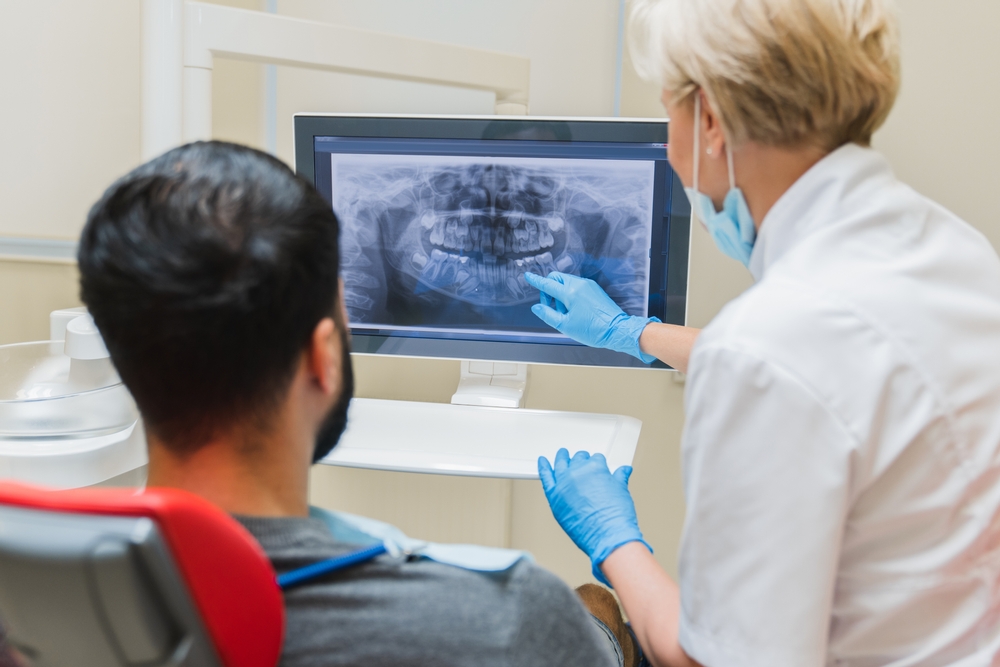
Gum disease advances through stages. Learn when you may need surgery and how to prevent gum disease from reaching that stage.
Gum disease is a common oral condition among American adults. According to the Centers for Disease Control and Prevention, nearly 50 percent of people over age 30 show signs of poor gingival health. Yet gum disease, or periodontitis, can be reversed through various methods, including surgery. But when does gum disease surgery become necessary?
The need for the procedure depends on how far the gum disease has advanced. Early-stage gum disease, or gingivitis, can be successfully treated with non-surgical procedures and by simply following good oral health practices. Surgery, including tissue grafts, may be needed to make your gums healthy again when the more severe form of periodontitis is present.
What can gum surgery do for you?
A buildup of bacteria and plaque leads to the formation of tartar on the teeth and gums. If tartar remains untreated, it can inflame the gum tissue and potentially cause gum recession and tooth loss.
Bleeding gums when brushing and flossing, as well as red, swollen gums, indicate gingivitis, the earliest form of gum disease. In the latter stages of gum disease, the gums pull away from the teeth, leaving a noticeable gap between the gum line and tooth where bacteria can attach and grow. As the gums become more inflamed, bone tissue is destroyed, and tooth loss becomes a definite possibility.
Treatment depends on how far the gum disease has progressed. With a severe stage of gum disease, surgery may be necessary. The goal of gum disease surgery is to:
- Close the gap between the gum line and tooth.
- Prevent tooth loss from weakened bones.
- Regenerate bone and gum tissue.
- Remove bacteria and other harmful substances from the gums and teeth.
- Prevent an infection.
- Reshape the jaw bone so bacteria cannot burrow into the bone crevices.
What are the types of gum surgery?
Depending upon the severity of the gum disease, your dentist may recommend these treatments:
Scaling and root planing. Scaling involves a deep cleaning of the teeth and gums to remove bacteria and tartar. Meanwhile, root planing cleans away tartar and bacteria from the root surface and smooths the root so bacteria and tartar cannot hide there. Both procedures are done together. Typically reserved for gingivitis, scaling and root planing can be performed with other gum disease treatments.
Flap surgery. After a tiny incision is made in the gums, the dentist lifts the gums back and removes tartar and bacteria. Once cleaned, the gums are stitched into place around the tooth.
Tissue grafts. A piece of tissue from the roof of your mouth is used to fill the gap between the gum line and the tooth. This is mainly used to treat receding gums.
Bone graft. To repair damaged bone, a bone graft may be needed. The dentist takes bone from your body or uses synthetic or donated bone to regenerate the bone tissue. Strengthening the bone prevents tooth loss.
Guided tissue regeneration. Material wedged between your bone and gum tissue spurs bone regrowth.
Minor bleeding and discomfort usually follow gum surgery but shouldn’t last long. You may be advised to stick to a soft-food diet for a week or two to help the gums heal. Your dentist may prescribe a special mouthwash or antibiotic after the surgery.
No doubt gum disease surgery can be uncomfortable, which is why it’s so essential to maintain your gum health with proper oral care. Brushing and flossing daily reduces the amount of bacteria and plaque on the teeth and gums. Rinsing with antimicrobial mouthwash has been shown to prevent gingivitis. But the most proactive thing you can do is schedule regular dental visits. Those twice-annual cleanings remove damaging tartar, while a thorough dental exam can spot gum disease early enough to avoid surgery.
Take care of your gums too!
Schedule an appointment at Espire’s Casper, Wyoming, location today! Our highly trained dentists can check your gums for signs of disease and propose treatment options, including surgery. Don’t live near our Casper, Wyoming, office? Find one of our other locations near you.
Casper, Wyoming
1530 Centennial Ct.
Suite A
Casper, WY 82609

